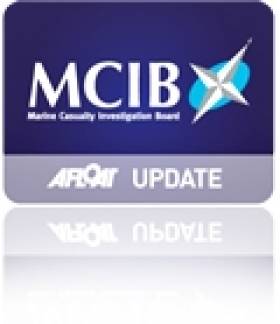Displaying items by tag: MFV Dean Leanne
Series Of Safety Breaches Led To Loss Of Three Lives In Tramore Bay Capsize - MCIB
#MCIB - Lack of adherence to water safety procedures led to the drowning of three fishermen off Waterford in the summer of 2013, according to marine investigators.
As previously reported on Afloat.ie, three bodies were recovered from the waters of Tramore Bay after a search for a missing fishing punt on the evening of 12 June 2013.
They were later named locally as brothers Paul, Shane and Kenny Bolger, all aged in their 40s.
Dunmore East RNLI coxswain Michael Griffin commented that the tragedy was "a devastating loss for the community."
He added: "I knew the men personally and had been at school with two of them. They were well known and respected by everyone."
The Marine Casualty Investigation Board's (MCIB) report into the fatal incident involving the MFV Dean Leanne, published this week, has found that a series of safety breaches contributed to the loss of the three men's lives.
Their small open vessel – which was rated to carry only two crew, and did not carry a valid Declaration of Comlpliance with the Fishery Vessel Safety Code of Practice – had headed out before 7am on the day to tend to lobster pots between Falskirt Rock and Brownstown Head.
This was in an area where the boat was not certified to operate, and where the sea conditions grew worse as the day progressed. The brothers had also not provided details of their trip with anyone ashore.
The fibreglassed exterior of the vessel was noted to be in poor condition with "extensive rot and decay" that would result in "reduced structural integrity" - putting boat and crew at risk as the swell built up.
Though it cannot be established exactly how the vessel came to capsize and throw the three overboard, it's believed whatever happened "occurred very quickly as no MAYDAY was transmitted by VHF radio or flares."
Two of the three men were found to be wearing personal flotation devices (PFDs) though only one of these was of the automatic hydrostatic release type, the other being manually operated and found still in its protective cover.
Both PFDs were also poorly maintained, with leaks in their air bladders.
The boat's EPIRB device, meanwhile, did not emit a signal to emergency services despite being found to have been manually operated, and subsequently coming into contact with water.
It was later found to have a defective microprocessor, and was one of a number of models for which its manufacturer later issued a recall notice, though family of the deceased confirm the handset was tested in the month before the incident.
The full MCIB report on the MFV Dean Leanne is available to download HERE.
























































